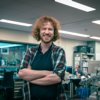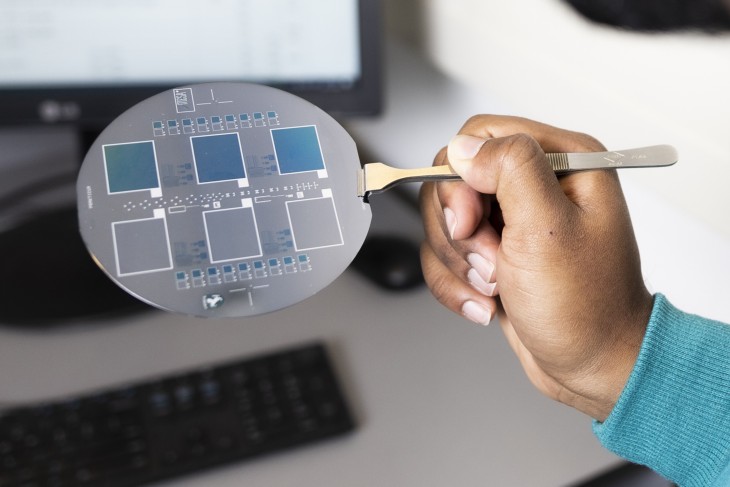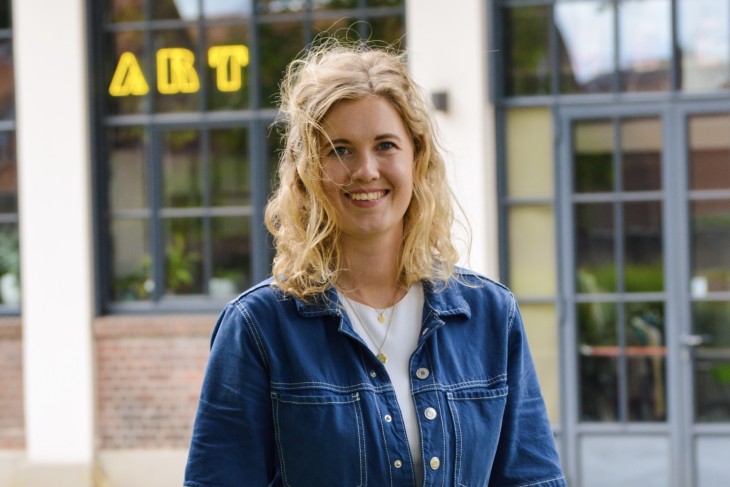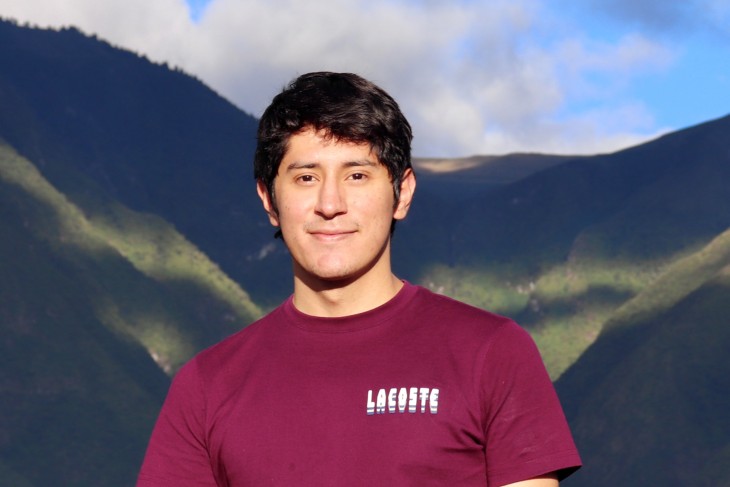Describe your student years in three words.
- Ben

Fantastic, instructive, and fun.
Why fantastic?
- Ben

It was the first time I lived on my own, and I learned a lot. And with that, I don’t mean only gaining an understanding of biomechanics, cell biology, and signal analysis. It was a process of self-discovery, becoming more independent: I explored who I am, what I stand for, and what I want to achieve.
What memory from your student time stays with you?
- Ben

A funny one is my thesis defence. It was online because the COVID-19 lockdown had just started. Everything had to be arranged at the last minute, and we all had to adjust to using the streaming services, which we initially thought could be limited to the graduation panel. But I wanted my friends and family to join, so I got creative: I used my personal laptop to set up a Skype video call and positioned it in such a way that they could watch me presenting. In the end, dozens of people attended.
You are now a biomedical engineer at the ZGT hospital. What do you do?
- Ben

It is exactly what I wanted to do: working in a hospital to ensure the quality and safety of the equipment. That was why I chose the Bachelor’s and Master’s in Biomedical Engineering in the first place. In my current role, I make sure the equipment is set up safely, works properly, and stays reliable over time. Besides, it is crucial that nurses and doctors know how to use it, and technical staff know how to maintain it, and I help them through training. Moreover, I advise departments when they want to buy new equipment: I help them decide what would be a sensible choice.
What kind of equipment is that?
- Ben

In my team, everyone specialises in a certain area. For example, one of my colleagues specialises in radiodiagnostic equipment such as MRI and PET-CT scanners; others work with medical equipment containing high-energy lasers.
My specialism concerns hospital-wide complex systems. For the past three and a half years, I have been leading a huge project where we replaced the entire call and alarm system in the hospital. The system has many functions, one of which is ensuring alarms from medical equipment, such as patient monitors, are delivered to and handled by the responsible caretaker. We had to renovate every room where the system was installed and train around 1,800 colleagues who work at the hospital. That was a massive operation, and I was responsible for taking a helicopter view. It required not only expertise in construction processes and IT infrastructure, but also an understanding of the connection between medical equipment and healthcare personnel.
Why did you choose this job?
- Ben

I wanted to get out of bed every morning and know that I make hospital care a little bit better. And my motivation got me here. I started emailing hospitals and asking if they needed someone with my skill set and enthusiasm. The ZGT hospital was just about to open a position. Luck played a role, but I was also proactive, and this is very important if you want to succeed.
What have you taken from Biomedical Engineering into your job?
- Ben

I gained a lot of knowledge in terms of the design process: how can we implement a certain device or equipment? This includes understanding the healthcare providers’ needs and problems, translating them into clear requirements, designing concepts, choosing the most promising solution, thinking of how to implement it, and validating it.
And what did you learn on the job?
- Ben

A lot! I encountered many challenges I hadn't thought about before. For example, I might come up with a system and implement it, but the people who will use it have different views. So, I learned to work closely not only with engineers but also with those who will use the system. Besides, I have to deal with all kinds of regulations, such as the Medical Device Regulation (MDR).
I also picked up a lot about change management: how to bring people along with adopting new medical tech systems, which is a very important part of the job. The Post-Master’s programme Qualified Medical Engineer at the Technical University of Eindhoven was very helpful in this regard.
What do you want to achieve in 10 years?
- Ben

I have found my place, and I want to continue helping hospitals improve the operation and efficiency of equipment, perhaps at a higher and more responsible level.
What is your advice to students?
- Ben

You can take your career in many directions with a Biomedical Engineering degree, so don’t worry about making the wrong decision. If you want to work in a hospital, just know there aren’t that many available positions, so don’t wait for the perfect job vacancy to appear. Be proactive and create your own opportunities.
Come study at the University of Twente
Did you like this article? Then you might find these study programmes interesting as well.
Related stories
 student CareerLooking for a career in chiptech? These master's programmes will get you thereWorking in chip technology means contributing to one of the most advanced and fast-moving sectors in science and engineering. As chips become smaller, faster, and more powerful, the demand for skilled engineers and researchers continues to grow. Eager to enter the field, but still unsure which way to go? Here are 10 relevant master’s degrees you can pursue at the University of Twente.
student CareerLooking for a career in chiptech? These master's programmes will get you thereWorking in chip technology means contributing to one of the most advanced and fast-moving sectors in science and engineering. As chips become smaller, faster, and more powerful, the demand for skilled engineers and researchers continues to grow. Eager to enter the field, but still unsure which way to go? Here are 10 relevant master’s degrees you can pursue at the University of Twente. student GraduatesFrom student to packaging specialist: “I make food packaging sustainable.”Emmilie is a sustainable packaging specialist at Now New Next, a brand and design packaging agency. She completed the Master’s in Industrial Design Engineering at the University of Twente.
student GraduatesFrom student to packaging specialist: “I make food packaging sustainable.”Emmilie is a sustainable packaging specialist at Now New Next, a brand and design packaging agency. She completed the Master’s in Industrial Design Engineering at the University of Twente. student GraduatesFrom student to metocean engineer: “I model ocean conditions.”Carlos is a metocean engineer at Van Oord, an offshore construction company focused on dredging and land reclamation. He completed the Master’s in Civil Engineering & Management with a specialisation in Water Engineering & Management at the University of Twente.
student GraduatesFrom student to metocean engineer: “I model ocean conditions.”Carlos is a metocean engineer at Van Oord, an offshore construction company focused on dredging and land reclamation. He completed the Master’s in Civil Engineering & Management with a specialisation in Water Engineering & Management at the University of Twente.

